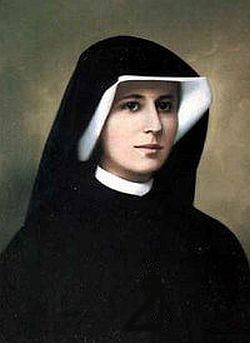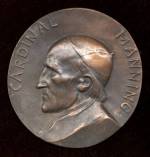THE DIVINE MERCY CHAPLET

THE FIVE FIRST SATURDAYS IS A DEVOTION NEEDED NOW MORE THAN EVER! FIND OUT MORE HERE
THE SAINT MICHAEL PRAYER AND THE ROSARY
ARE ALSO POWERFUL PRAYERS TO HELP US THROUGH THESE VERY TURBULENT TIMES!
FATHER CHAD RIPPERGER HAS RELEASED A PRAYER FOR THE CONSECRATION OF THOSE GOVERNING TO THE BLESSED VIRGIN MARY
DETAILS (AND THE PRAYER ITSELF) HERE WITH AN UPDATED PRAYER TO OUR LADY HERE
HIGHLY RECOMMENDED! DELIVERANCE PRAYERS,
A BOOK FROM SENSUS TRADITIONIS PRESS
(A GREAT PUBLISHER HELPING US FIGHT OUR MANY SPIRITUAL BATTLES NOWADAYS)!
OUR WEB STORE HAS GREAT PRAYER RESOURCES FOR YOUR LENTEN JOURNEY AND BEYOND!
CHECK OUT OUR PODCAST PAGE AND OUR YOUTUBE CHANNEL FOR INSPIRING CONTENT
The Divine Mercy Chaplet is a beautiful prayer composed by our Lord Himself to help foster devotion to His Divine Mercy! He taught it to a Polish nun, Saint Maria Faustina Kowalska (pictured at left) in 1935, in one of His many private revelations to her.
Jesus conveyed to her our need to ask for His mercy, to be merciful ourselves, and to trust in Him completely. Mercy is a key part of the love that He has for us and wants us to show each other.
The Divine Mercy Chaplet is simpler to memorize than it looks at first glance! (The opening and closing prayers, while desirable, are optional.) You can pray it using rosary beads as follows:
First, make the sign of the cross. Then you can pray either, or both, of these two optional opening prayers:
You expired, Jesus, but the source of life gushed forth for souls, and the ocean of mercy opened up for the whole world. O Fount of Life, unfathomable Divine Mercy, envelop the whole world and empty Yourself out upon us.
Or:
O Blood and Water, which gushed forth from the Heart of Jesus as a fountain of Mercy for us, I trust in You!
Then, on the first three beads: say the Our Father
Our Father, Who art in heaven, hallowed be Thy name; Thy kingdom come; Thy will be done on earth as it is in heaven. Give us this day our daily bread; and forgive us our trespasses as we forgive those who trespass against us; and lead us not into temptation, but deliver us from evil, Amen.
the Hail Mary,
Hail Mary, full of grace. The Lord is with thee. Blessed art thou amongst women, and blessed is the fruit of thy womb, Jesus. Holy Mary, Mother of God, pray for us sinners, now and at the hour of our death, Amen.
and the Apostles Creed:
I believe in God, the Father Almighty, Creator of heaven and earth; and in Jesus Christ, His only Son, our Lord, Who was conceived by the Holy Spirit, born of the Virgin Mary, suffered under Pontius Pilate, was crucified, died, and was buried. He descended into hell; the third day he rose again from the dead; He ascended into Heaven, and is seated at the right hand of God, the Father Almighty; from thence he shall come to judge the living and the dead; I believe in the Holy Spirit, the Holy Catholic Church, the Communion of Saints, the forgiveness of sins, the resurrection of the body, and the life everlasting. Amen.
Then you pray the rest of the Divine Mercy Chaplet as follows: for each of the five decades on the large bead (the one you’d say the Our Fatheron in the rosary) say:
Eternal Father, I offer you the Body and Blood, Soul and Divinity of Your Dearly Beloved Son, Our Lord, Jesus Christ, in atonement for our sins and those of the whole world.
Then on the ten small beads (the ones you’d say the Hail Mary on in the rosary) for each of the five decades, say:
For the sake of His sorrowful Passion, have mercy on us and on the whole world.
Then, after having completed the prayer’s five decades, you recite the following, three times:
Holy God, Holy Mighty One, Holy Immortal One, have mercy on us and on the whole world.
You can then conclude the Divine Mercy Chaplet with the following optional closing prayer:
Eternal God, in whom mercy is endless and the treasury of compassion inexhaustible, look kindly upon us and increase Your mercy in us, that in difficult moments we might not despair nor become despondent, but with great confidence submit ourselves to Your holy will, which is Love and Mercy itself.
The reference to our Lord’s Passion serves as a poignant reminder of just how much God loves us that He would allow His only son to suffer and die for us, so that, as we hear at Mass, “sins may be forgiven.”
Jesus wasn’t revealing a new doctrine about forgiveness to Saint Faustina. Scripture abounds with references to God's mercy. Among a number of examples, we read in the Psalms that “the Lord is gracious and merciful” (Ps 145:8). In the Our Father (printed above) we ask God to forgive us as we forgive others.
Christ introduced His parable of the Unmerciful Servant in Matthew’s gospel by instructing His followers to forgive others “seventy times seven times” (Matt 18:22). And, you might also remember His famous proclamation in the Sermon on the Mount that “blessed are the merciful, for they will be shown mercy” (Matt: 5:7).
What was new was that our Lord wished Saint Faustina to help establish an apostolic movement of Divine Mercy so that even the most hardened sinners would know that they could obtain His mercy if they asked for it with a spirit of true repentance.
The Divine Mercy Chaplet, along with other prayers would help spread this devotion to His mercy, as would veneration of a special image he asked St. Faustina to have painted with the words “Jesus I Trust In you” printed below it as shown here.
In addition, our Lord expressed His desire that the Sunday after Easter be the Feast of Mercy. (This was practiced as a devotion for many years before Pope John Paul II designated this day as Divine Mercy Sunday in the Catholic liturgical calendar in 2000, described in more detail here.)
Jesus also made known to St. Faustina his desire for us to pray and meditate on His passion at 3:00 pm, the time of His death on the cross,(at which time, he told her, “mercy was opened wide for every soul”) even if only for a moment. (This can also be a great time to pray the opening prayers to the Divine Mercy Chaplet, given above, or the chaplet itself!)
Saint Faustina served Jesus with great love and grace in convents in Poland from 1925 until her death from tuberculosis in 1938. She recorded many of His words to her in her now famous diary, written from 1934 on at the request of her spiritual director, Father Michael Sopocko, and at our Lord’s command as well.
In spite of her deep humility, she had a sense of the impact her mission as Christ’s Apostle and Secretary of His mercy (as He referred to her in her diary) would have after her death.
Indeed, the Marians of the Immaculate Conception have published and distributed literally millions of copies of the Divine Mercy Chaplet, the Divine Mercy Image, and various booklets on this devotion (many including a Divine Mercy Novena as well) in the almost seventy years since Saint Faustina’s death. Pope John Paul II paid tribute to her important role in establishing Divine Mercy Sunday at her canonization in 2000.
Note that we must approach our Lord in praying the Divine Mercy Chaplet, and in this devotion itself, with love in our hearts, not just words on our lips. He will not refuse us His mercy if our contrition is genuine.
Also, we must show others the mercy and love that we would have God show us and frequently partake of His graces in the the Sacrament of the Eucharist (Holy Communion) and Penance (Confession).
It has been said it is easier to believe in God than to trust in Him. Do you find yourself agreeing with that statement at times? Our Lord answered this concern by telling Saint Faustina that when we approach Him with trust, He’s ready to give us an abundance of graces and mercy.
Even our sufferings can be of great spiritual benefit on our journey towards Eternal Life with God in Heaven if we, in the midst of our trials, allow Him to give us the grace to withstand them, for the forgiveness of sins.
Christ's love for us is boundless, a fountain of mercy ready to flow into our vessel of trust, as He also told her. We just need to show our love for Him in return in how we follow His will for us and in how we treat others.
If you don’t feel particularly loving towards those annoying bosses, co-workers, or family members who've harmed you in some way, (much less the guy who cuts you off in traffic!) at least pray for them, don’t hold grudges, and try not to return petty treatment in kind. After all, we are praying in the Divine Mercy Chaplet for God’s mercy for not only ourselves but also for “the whole world!”
Jesus Himself told Saint Faustina that Mankind would not have real peace until we turned with trust to His mercy. Let the Divine Mercy Chaplet help you find, and bring, Christ’s peace into your life and into the lives of others!
FROM OUR BOOK AND GIFT STORE
OR CAFE PRESS STORE!
22
Return from the Divine Mercy Chaplet
to Catholic Daily Prayers














